SEO vs. PPC: Comparative Analysis, Integration, and Trends
-

-
Shivendra Saxena
08 Feb, Thu
Content
-
Introduction -
Importance Of Choosing The Right Digital Marketing Strategy -
SEO (Search Engine Optimization) -
PPC (Pay-Per-Click) -
In-Depth Comparative Analysis of SEO And PPC -
Factors Influencing the Choice Between SEO And PPC -
Integration Of SEO And PPC For Ideal Results -
Emerging Trends In SEO And PPC -
Conclusion -
Faq
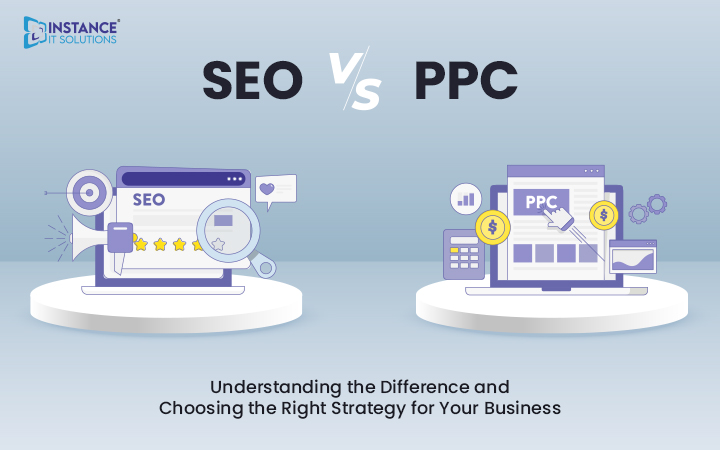
Introduction
In the dynamic landscape of today's digital age, establishing a robust online presence has become imperative for individuals and businesses alike. The significance of an online presence extends far beyond mere visibility; it is a crucial driver of success and growth in an interconnected world. In an era where the internet serves as the epicenter of information, commerce, and communication, having a substantial online presence is not just an advantage; it's a necessity. Â
Whether you're an individual looking to build a personal brand or a business striving for market dominance, the online arena offers unparalleled opportunities. A robust online presence enhances visibility and fosters engagement, trust, and credibility among your audience. Â
The advent of social media, e-commerce platforms, and search engines has transformed the way people discover, interact with, and evaluate products and services. With a compelling online presence, individuals and businesses can avoid being overshadowed by competitors who have effectively leveraged the digital realm to connect with their audience. Thus, understanding the intricacies of online presence and harnessing its power is paramount for sustained success.Â
Importance Of Choosing The Right Digital Marketing Strategy
While the internet provides an expansive canvas for showcasing offerings, the sheer volume of online content necessitates a strategic approach. Digital marketing serves as the compass that guides businesses and individuals through the vast digital landscape. Â
However, the effectiveness of a digital marketing strategy hinges on its alignment with overarching goals, target audience, and industry dynamics. Choosing the right digital marketing strategy is akin to selecting the most fitting tool for a specific task. Â
A well-crafted strategy not only optimizes resources but also maximizes reach and impact. It involves understanding the nuances of the digital ecosystem, identifying the channels most frequented by the target audience, and tailoring content and campaigns accordingly. Â
In essence, the right digital marketing strategy acts as a catalyst, propelling an online presence from obscurity to prominence. Among many digital marketing strategies, Search Engine Optimization (SEO) and Pay-Per-Click (PPC) stand out as cornerstones for establishing and enhancing online visibility. Here are brief definitions of both of them.Â
SEO (Search Engine Optimization)
SEO is the art and science of optimizing online content to rank higher in search engine results. By understanding and adapting to search engine algorithms, SEO aims to increase organic (non-paid) traffic to a website. This involves keyword optimization, content creation, link building, and technical enhancements. A well-executed SEO strategy not only improves a website's visibility but also enhances its credibility in the eyes of search engines. Â
The long-term benefits of SEO are substantial. Once a website establishes a strong organic presence, it can attract a consistent flow of targeted traffic, enhance brand credibility, and reduce dependency on paid advertising. However, SEO is not without challenges. Â
It requires continuous efforts as search engine algorithms evolve, and staying ahead of the competition demands adaptability and persistence. Successful implementations often involve a combination of technical SEO enhancements, content optimization, and link-building efforts.Â
PPC (Pay-Per-Click)
On the other hand, PPC is a model of online advertising where advertisers pay a fee each time their ad is clicked. It provides a more immediate and targeted approach to reaching the audience. PPC campaigns, often facilitated through platforms like Google Ads, allow businesses to bid on keywords relevant to their offerings. Â
When users search for those keywords, the ads appear at the top of search results. PPC offers a rapid way to drive traffic and is particularly effective for time-sensitive promotions or when aiming for specific demographics. Effective budgeting is crucial for PPC success. Â
Advertisers set daily or monthly budgets, and costs depend on factors like keyword competitiveness and bid amounts. Strategic budget allocation, continuous monitoring, and adjustments based on campaign performance are essential for maximizing the return on investment in PPC advertising.Â
In-Depth Comparative Analysis of SEO And PPC
When evaluating cost-effectiveness, SEO often takes the lead as it focuses on organic, unpaid traffic. While there are upfront costs associated with optimizing a website, the long-term benefits, such as sustained visibility without ongoing per-click charges, make SEO a cost-efficient strategy over time. In contrast, PPC involves continuous costs since advertisers pay for each click. While PPC can provide immediate results, its ongoing expense may be higher than SEO in the long run. PPC is known for its rapid results. Â
Advertisers can launch campaigns, bid on keywords, and see their ads at the top of search engine results almost instantly. This makes PPC an ideal choice for those seeking immediate visibility and traffic. On the other hand, SEO is a gradual process. Â
It takes time for search engines to index and rank optimized content. While the timeline for SEO success varies, it generally requires patience, with visible improvements often seen over weeks rather than days. SEO shines when it comes to sustainability. Â
Once a website establishes authority and relevance through SEO practices, it can enjoy organic traffic for an extended period without incurring additional click costs. SEO's long-term impact stems from its ability to build a solid foundation, improve user experience, and foster trust with both users and search engines. PPC, while effective in the short term, relies on continuous investment. Pausing PPC campaigns often leads to an immediate drop in visibility. Â
PPC provides precise targeting capabilities, allowing advertisers to choose specific keywords, demographics, locations, and even devices to display their ads. Â
This granular control enables businesses to tailor their messaging to specific audience segments. SEO, while effective in reaching a broad audience, may lack the same level of precision in targeting. However, SEO's strength lies in attracting a diverse range of organic traffic based on the relevance of content to search queries.Â
Factors Influencing the Choice Between SEO And PPC
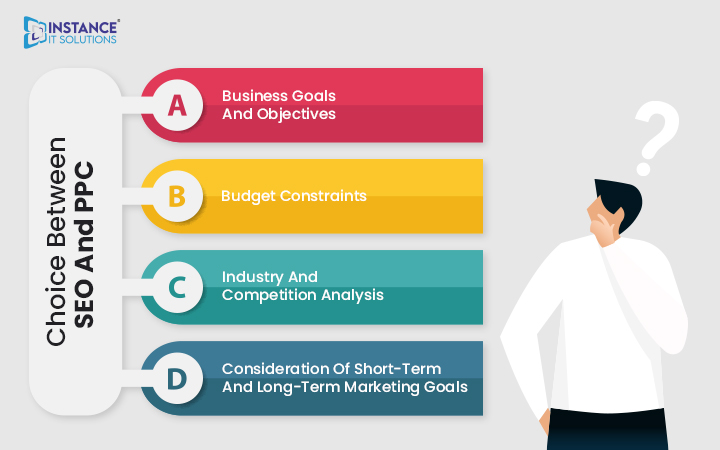
Business Goals and ObjectivesÂ
The first and foremost factor influencing the choice between SEO and PPC is the alignment with business goals and objectives. Different marketing strategies cater to distinct objectives. If the primary goal is to establish long-term, sustainable visibility and credibility, SEO becomes the preferred choice. Â
On the other hand, if the focus is on immediate visibility, lead generation, or promoting a time-sensitive offer, PPC may be more suitable. Understanding the specific goals of the business sets the foundation for a targeted and effective digital marketing strategy.Â
Budget ConstraintsÂ
Budget considerations play a pivotal role in determining the most viable marketing approach. SEO, while cost-effective over the long term, requires upfront investments in content creation, website optimization, and ongoing efforts. PPC, with its pay-per-click model, allows businesses to control spending more directly. It provides flexibility in setting daily or campaign budgets, making it suitable for businesses with tighter financial constraints or those seeking more predictable and manageable expenses.Â
Industry And Competition AnalysisÂ
The nature of the industry and the level of competition within it are crucial factors influencing the choice between SEO and PPC. In highly competitive industries where securing top organic rankings is challenging, PPC can offer a faster route to visibility. Â
Conversely, in industries with lower competition, a well-executed SEO strategy may yield significant results. Analyzing the competitive landscape helps businesses identify where they can gain a competitive advantage and informs the decision on whether to prioritize organic or paid search efforts.Â
Consideration Of Short-Term and Long-Term Marketing GoalsÂ
Businesses need to balance short-term gains with long-term sustainability when crafting a digital marketing strategy. PPC is advantageous for short-term goals, providing immediate visibility and results. It's particularly effective for time-sensitive promotions or product launches. SEO, while requiring more time to see results, offers a foundation for long-term success. Businesses aiming for a steady, organic growth trajectory often find SEO indispensable for building a durable online presence.Â
Integration Of SEO And PPC For Ideal Results
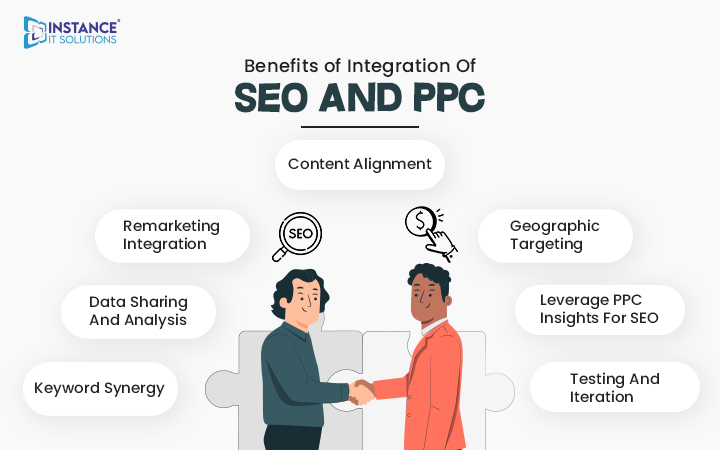
Integrating SEO and PPC creates a synergistic digital marketing strategy that leverages the strengths of both approaches. The two channels, while distinct, can complement each other, leading to enhanced visibility, improved targeting, and increased overall effectiveness. When SEO and PPC work in tandem, they reinforce each other's impact on the target audience.Â
Keyword SynergyÂ
Identify high-performing keywords through PPC campaigns and integrate them into SEO strategies. This cross-channel keyword synergy helps in targeting the exact keywords from different angles, maximizing overall visibility.Â
Data Sharing and AnalysisÂ
Leverage data from both SEO and PPC campaigns to gain insights into user behaviour, preferences, and conversion patterns. This shared data can inform content strategies, audience targeting, and overall campaign optimization.Â
Remarketing IntegrationÂ
Use PPC for remarketing to audiences who have visited the website but haven't converted. Optimize SEO efforts to capture organic traffic and nurture those leads over time. This integrated approach reinforces brand recall and encourages conversions.Â
Content AlignmentÂ
Ensure consistency in messaging across PPC ad copy and organic content. A unified brand message across both channels enhances brand credibility and recognition.Â
Geographic TargetingÂ
Use PPC for precise geographic targeting based on immediate business priorities. Meanwhile, SEO efforts can focus on broader geographic reach, contributing to overall brand awareness and authority.Â
Leverage PPC Insights For SEOÂ
Insights gained from PPC campaigns, such as high-converting ad copy or optimal landing pages, can be applied to SEO strategies. This iterative approach ensures continuous improvement based on real-time performance data.Â
Testing And IterationÂ
Run A/B tests on PPC campaigns and apply successful strategies to organic content and vice versa. This iterative process helps in refining both ways for maximum impact.Â
Emerging Trends In SEO And PPC
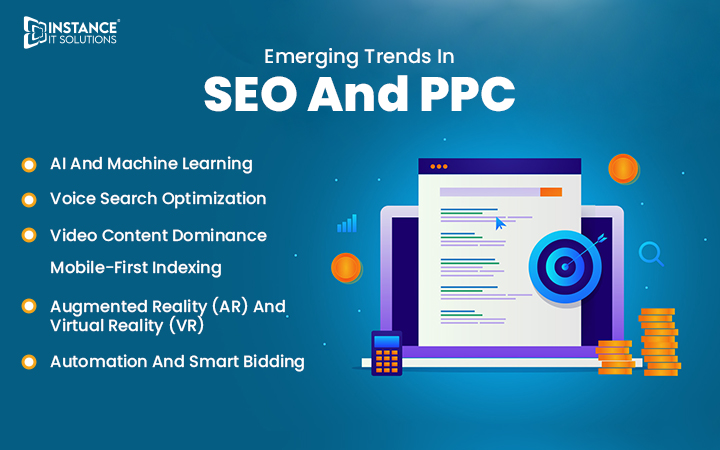
AI And Machine LearningÂ
The integration of artificial intelligence and machine learning in SEO and PPC is becoming increasingly prevalent. Search engines are using AI algorithms for a better understanding of user intent, and PPC platforms are employing machine learning to optimize ad targeting and bidding strategies.Â
Voice Search OptimizationÂ
With the rise of virtual assistants and smart speakers, optimizing for voice search is gaining importance. Future SEO strategies will need to adapt to conversational queries and natural language patterns.Â
Video Content DominanceÂ
Video content is expected to continue its upward trajectory. Search engines increasingly favor video content, and incorporating video into both SEO and PPC strategies will be essential for capturing audience attention.Â
Mobile-First IndexingÂ
As mobile usage continues to surge, search engines prioritize mobile-first indexing. SEO and PPC strategies must prioritize mobile optimization for visibility in search results.Â
Augmented Reality (AR) And Virtual Reality (VR)Â
AR and VR technologies are poised to transform user experiences. Integrating these technologies into marketing strategies, particularly in PPC advertising, can provide immersive and engaging interactions with consumers.Â
Automation And Smart BiddingÂ
Automation tools and smart bidding algorithms in PPC are becoming more sophisticated. Advertisers need to leverage these technologies to optimize campaigns, target audiences more effectively, and enhance overall efficiency. Â
Stay abreast of industry trends and updates by engaging in continuous learning. Attend webinars, conferences, and training programs to stay informed about emerging technologies and best practices in SEO and PPC. The digital landscape is dynamic, and adaptability is key to staying ahead. Be prepared to pivot strategies based on technological advancements, algorithm changes, and shifts in consumer behavior. Â
Prioritize a user-centric approach in both SEO and PPC strategies. Understanding and catering to user intent, preferences, and behaviors will be crucial for success in the evolving online environment. Explore and diversify across various digital marketing channels. While SEO and PPC are integral, incorporating social media, email marketing, and other channels diversifies your online presence and mitigates risks associated with changes in algorithms or policies. Â
Embrace automation tools and technologies to streamline processes, enhance efficiency, and leverage data-driven insights for informed decision-making in both SEO and PPC campaigns.Â
Conclusion
In the journey through the realms of SEO and PPC, we explored the significance of online presence, the choice between these strategies, and the integration of both for a holistic approach. Selecting the right strategy depends on a business's unique goals and circumstances. For immediate visibility and short-term goals, PPC offers a swift solution. Â
However, for sustained growth, organic visibility, and long-term credibility, SEO stands as a foundational pillar. The optimal approach often involves an integration of both strategies, strategically balancing short-term gains with long-term sustainability based on specific business objectives. In the dynamic landscape of digital marketing, adaptation is paramount. Â
Technological advancements, emerging trends, and evolving consumer behaviors necessitate continuous monitoring and adjustment. Staying ahead requires a proactive approach, embracing new technologies, and being agile in response to changes in algorithms, regulations, and market dynamics. Continuous learning, adaptability, and a user-centric focus will empower businesses to not only navigate but thrive in the ever-evolving digital space. Â
If you are looking for digital marketing professionals to take your business to new heights, get in touch with Instance IT Solutions right away. We can make your online profits grow swiftly.Â
We are trusted by over 650+ clients.
Join them by using our services and grow your business.
Request a callbackRequest a callback


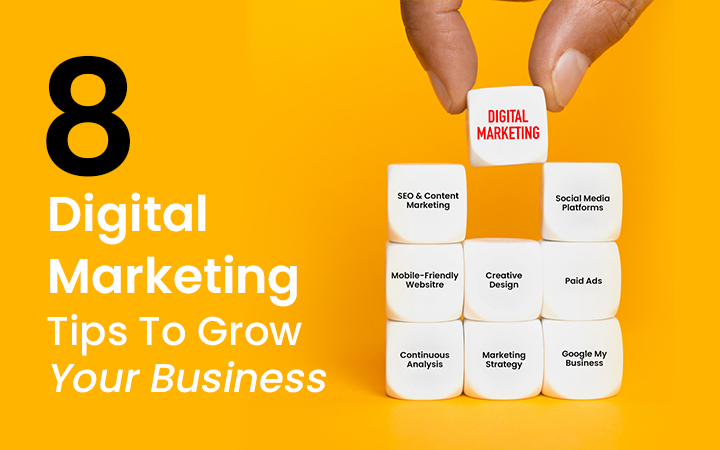
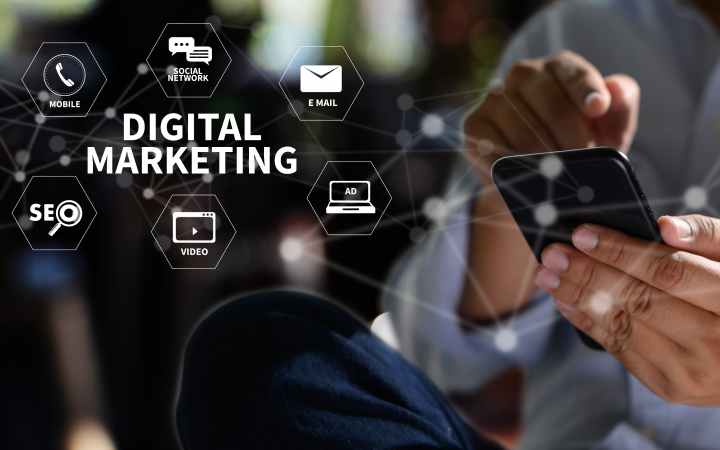
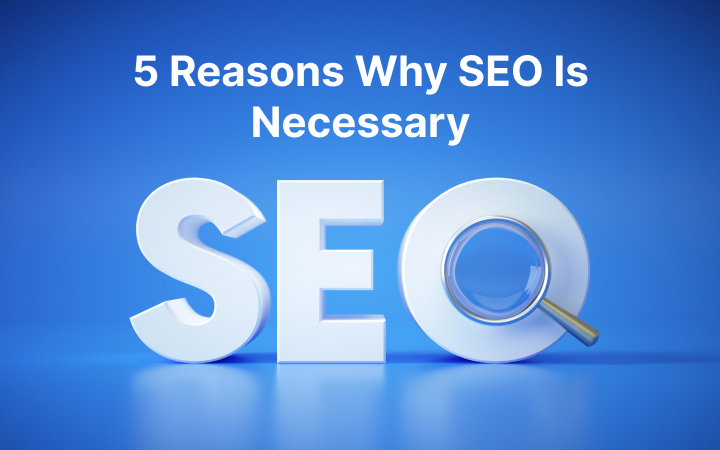
 Contact Us
Contact Us
